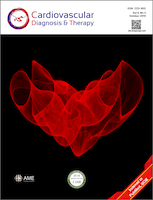
Cardiovascular Diagnosis and Therapy
Scope & Guideline
Elevating Standards in Cardiovascular Medicine and Research
Introduction
Aims and Scopes
- Cardiovascular Imaging and Diagnostics:
The journal focuses extensively on advancements in cardiovascular imaging modalities, such as cardiac magnetic resonance imaging and computed tomography, emphasizing their role in diagnosing and monitoring cardiovascular conditions. - Machine Learning and Artificial Intelligence:
A significant area of research includes the application of machine learning and artificial intelligence in predicting cardiovascular events, improving diagnostic accuracy, and automating clinical processes. - Therapeutic Interventions and Outcomes:
Research on various therapeutic interventions, including surgical and non-surgical methods, explores outcomes and effectiveness in treating cardiovascular diseases, thereby contributing to evidence-based clinical practices. - Pathophysiology and Mechanistic Studies:
The journal publishes studies that investigate the underlying mechanisms of cardiovascular diseases, including molecular, cellular, and genetic factors, providing insights into potential therapeutic targets. - Public Health and Epidemiology:
There is a growing emphasis on public health implications, epidemiological studies, and the management of cardiovascular risk factors in diverse populations, highlighting the social determinants of cardiovascular health.
Trending and Emerging
- Integration of Artificial Intelligence in Cardiology:
The increasing use of artificial intelligence for diagnostic purposes and treatment predictions represents a significant trend, showcasing its potential to enhance the accuracy and efficiency of cardiovascular care. - Focus on Patient-Centered Outcomes:
Research increasingly emphasizes patient-centered outcomes, including quality of life and patient-reported outcomes, reflecting a broader trend towards holistic care in cardiovascular treatment. - Exploration of Cardiovascular Impacts of Systemic Diseases:
Emerging studies examine the cardiovascular implications of systemic diseases, such as diabetes and COVID-19, highlighting the interconnectedness of cardiovascular health with other health conditions. - Advancements in Non-Invasive Techniques:
There is a growing trend towards non-invasive diagnostic techniques, such as advanced imaging modalities, which improve patient safety and comfort while providing accurate diagnostic information. - Personalized Medicine Approaches:
The move towards personalized medicine in cardiovascular care is gaining momentum, with research increasingly focusing on tailoring treatments based on individual genetic, environmental, and lifestyle factors.
Declining or Waning
- Traditional Surgical Techniques:
While surgical techniques remain important, the volume of publications focusing solely on traditional surgical approaches has decreased, possibly due to a shift towards minimally invasive and transcatheter methods. - Single-Factor Risk Assessments:
Studies concentrating on single-factor risk assessments for cardiovascular diseases, such as isolated assessments of traditional risk factors (e.g., cholesterol levels), are becoming less common in favor of more integrative approaches that consider multifactorial influences. - Basic Laboratory Studies:
There seems to be a decline in the publication of basic laboratory studies focusing on isolated cellular or molecular mechanisms without direct clinical relevance, as the journal increasingly prioritizes translational and clinical research. - Acute Care Management:
Research specifically centered on acute care management strategies appears to be declining, potentially overshadowed by a broader focus on chronic disease management and long-term outcomes.
Similar Journals

Open Cardiovascular Medicine Journal
Connecting Researchers and Clinicians for Heart HealthOpen Cardiovascular Medicine Journal is a notable scholarly platform published by Bentham Science Publishers Ltd, dedicated to advancing knowledge in the field of cardiology and cardiovascular medicine. With an E-ISSN of 1874-1924, this open-access journal has been a beacon for researchers and clinicians alike since its inception in 2009. Acting as a conduit for the latest research findings, the journal fosters interdisciplinary collaboration and innovation, contributing to the overall progress in cardiovascular health. Although currently ranked in the 26th percentile among cardiology journals, it emphasizes high-quality, peer-reviewed articles that uphold the rigorous standards of academic integrity. The journal also benefits from a robust editorial team and an array of publication options, ensuring accessibility and visibility of crucial cardiovascular research. As it continues its journey through 2023 and beyond, Open Cardiovascular Medicine Journal remains essential for anyone invested in the challenges and advancements within the cardiovascular domain.
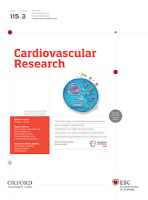
CARDIOVASCULAR RESEARCH
Innovating research for a healthier heart.CARDIOVASCULAR RESEARCH, published by Oxford University Press, is a premier academic journal dedicated to the evolving field of cardiology and cardiovascular medicine. With a remarkable impact factor reflecting its significant contribution to the scientific community, this journal maintains a Q1 ranking in both Cardiology and Physiology categories, demonstrating its commitment to publishing high-quality research that influences clinical practices and healthcare outcomes. Established in 1967, the journal has consistently provided a platform for innovative studies and reviews, aiming to advance our understanding of cardiovascular physiology and pathology. Researchers, professionals, and students will find published articles crucial for their work, as the journal covers a broad spectrum of topics including molecular biology, genetics, and clinical studies. While currently not offering open access options, CARDIOVASCULAR RESEARCH remains accessible through institutional and individual subscriptions, ensuring that the latest findings are available to those in the cardiovascular science community.

JOURNAL OF CARDIOVASCULAR PHARMACOLOGY AND THERAPEUTICS
Enhancing knowledge for a healthier heart.The JOURNAL OF CARDIOVASCULAR PHARMACOLOGY AND THERAPEUTICS, published by SAGE PUBLICATIONS INC, is a premier resource in the fields of cardiology and pharmacology, with an impressive impact factor reflective of its significant contributions to the scientific community. Established in 1996 and continuing through 2024, this journal is indexed in Scopus, achieving notable rankings, including Q2 in both Cardiology and Cardiovascular Medicine and Pharmacology. By fostering a multidisciplinary approach, it aims to improve pharmaceutical therapies and patient outcomes in cardiovascular health. Although not an open-access journal, it provides various subscription options to grant access to its cutting-edge research and reviews. As a vital platform for meaningful discourse and innovation in cardiovascular pharmacology, the journal attracts a diverse readership of researchers, professionals, and students, enhancing knowledge and advancing the field.

REVISTA ESPANOLA DE CARDIOLOGIA
Transforming Cardiovascular Research into Real-World ImpactREVISTA ESPANOLA DE CARDIOLOGIA is a premier journal dedicated to the dynamic field of cardiology, published by EDICIONES DOYMA S A in Barcelona, Spain. With an impressive Q1 status in the Medicine (miscellaneous) category for 2023, this journal is recognized for its significant contributions to cardiovascular research, evidenced by its rank of #61 out of 387 in the Scopus database, placing it within the top 16% of journals in its field. Covering a broad range of topics within cardiology, the journal aims to disseminate high-quality research, clinical studies, and educational content, fostering knowledge sharing among researchers, clinicians, and students alike. While it does not currently offer open access, the journal maintains a commitment to advancing cardiovascular health through rigorous peer-reviewed articles. With a publication history that spans from 2013 to 2024, REVISTA ESPANOLA DE CARDIOLOGIA is an essential resource for those seeking to stay at the forefront of cardiology advancements and practices.
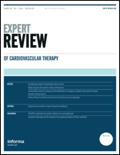
Expert Review of Cardiovascular Therapy
Elevating Standards in Cardiovascular Research and CareExpert Review of Cardiovascular Therapy is a leading academic journal published by TAYLOR & FRANCIS INC, focusing on innovative and impactful research in the field of cardiovascular medicine. With an ISSN of 1477-9072 and an E-ISSN of 1744-8344, this journal serves as an essential resource for researchers, clinicians, and educators, offering a platform for the dissemination of critical advancements in cardiovascular therapy and internal medicine. Since its inception in 2003, the journal has maintained a reputable standing with a Q2 ranking in various categories including Cardiology and Cardiovascular Medicine, reflecting its influence and rigor in the field. The journal, which is based in the United Kingdom, does not currently offer Open Access options, ensuring that its content is accessible primarily to subscribers. With its commitment to high-quality, peer-reviewed articles, Expert Review of Cardiovascular Therapy is dedicated to bridging the gap between experimental research and clinical application, thereby enhancing patient care and therapeutic outcomes in cardiovascular health.

ARCHIVOS DE CARDIOLOGIA DE MEXICO
Advancing cardiovascular knowledge for a healthier tomorrow.ARCHIVOS DE CARDIOLOGIA DE MEXICO is a premier open-access journal dedicated to advancing research and clinical practice in the field of cardiology and cardiovascular medicine. Published by the Instituto Nacional de Cardiología Ignacio Chávez since 2001, this journal offers a valuable platform for the dissemination of high-quality, peer-reviewed articles that span diverse aspects of cardiovascular health. With its current categorization in the fourth quartile (Q4) of cardiology journals and a Scopus rank of #319 out of 387, ARCHIVOS DE CARDIOLOGIA DE MEXICO is positioned within the dynamic landscape of cardiovascular research, presenting opportunities for both emerging and established voices in the field. It aims to promote discussion and innovation across various topics in cardiology, making it a crucial resource for researchers, healthcare professionals, and students keen on keeping abreast of developments in cardiovascular science. Accessible online since 2009, this journal fosters collaboration and knowledge sharing among specialists worldwide, establishing itself as a significant contributor to the global discourse on heart health.
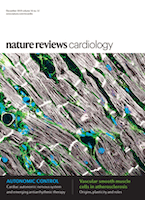
Nature Reviews Cardiology
Navigating the Complexities of Cardiovascular Health TogetherNature Reviews Cardiology, published by NATURE PORTFOLIO, stands as a premier academic journal in the field of cardiology and cardiovascular medicine, boasting an impressive impact factor and a distinguished ranking of #1 out of 387 in Scopus. Since its inception in 2009, this exemplary journal has continuously delivered cutting-edge reviews and insights, supporting researchers, healthcare professionals, and students in navigating the complex landscape of cardiovascular health. With a commitment to providing open access and disseminating rigorous research, Nature Reviews Cardiology captures the forefront of innovation and scholarship, critical for facilitating advancements in cardiovascular science and clinical practice. Situated in the United Kingdom and with a vibrant global readership, this journal perpetuates academic excellence, ensuring accessibility to the latest findings that shape prevention, diagnosis, and treatment strategies in cardiology through to 2024 and beyond.
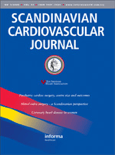
SCANDINAVIAN CARDIOVASCULAR JOURNAL
Elevating standards in cardiovascular healthcare and research.The Scandinavian Cardiovascular Journal, published by Taylor & Francis Ltd, is a distinguished peer-reviewed journal aimed at advancing the field of cardiology and cardiovascular medicine. With an impressive history dating back to 1967 and a forward-looking perspective until 2024, it has consistently contributed valuable research and insights, making it essential reading for anyone involved in cardiovascular healthcare. The journal holds a strong position in the academic community, reflected in its Q2 rating in both Cardiology and Cardiovascular Medicine, and a similar classification in the broader field of Medicine as of 2023. It is indexed in multiple databases, with a Scopus rank of #178 out of 387 in its category, placing it in the 54th percentile. The journal provides open access options, promoting wider dissemination of knowledge while supporting both researchers and practitioners dedicated to improving cardiovascular health. Its focus on high-quality, impactful research makes it an invaluable resource for professionals and students alike, keen to stay at the forefront of cardiology advancements.

JAMA Cardiology
Advancing Cardiovascular Knowledge, One Study at a Time.JAMA Cardiology, published by the American Medical Association, is a leading peer-reviewed journal in the field of cardiology and cardiovascular medicine, with an impressive impact factor signifying its influence and relevance within the medical community. Established in 2016, this journal has quickly gained recognition, currently positioned in the Q1 quartile and ranked #2 out of 387 in its field according to Scopus, reflecting its commitment to high-quality research dissemination. As an esteemed publication, JAMA Cardiology aims to advance the understanding of cardiovascular health through rigorous studies, reviews, and clinical insights. The journal is dedicated to serving a diverse audience of researchers, clinicians, and students, ensuring they have access to groundbreaking findings and comprehensive discussions that shape contemporary cardiology. Although it is not an open-access journal, articles published within it play a pivotal role in informing clinical practice and guiding future research in cardiovascular health, making it an essential resource for anyone engaged in this vital field.

Cardiology Journal
Advancing cardiovascular knowledge without barriers.Cardiology Journal, published by VIA MEDICA, stands as a prominent resource in the field of cardiology and cardiovascular medicine, with an ISSN of 1897-5593 and an E-ISSN of 1898-018X. Recognized for its Open Access model established since 1994, this journal facilitates widespread dissemination of critical research findings, allowing practitioners and researchers globally to access valuable insights without barriers. Based in Poland, with an address at UL SWIETOKRZYSKA 73, 80-180 GDANSK, it has achieved a respectable Q2 classification in 2023 for both Cardiology and Miscellaneous Medicine categories, reflecting its influence and quality within the scholarly community. With a Scopus ranking placing it at #117 out of 387 in Cardiology, it lies within the 69th percentile, underpinning its commitment to advancing knowledge in cardiovascular health. The journal’s converged years extending from 2006 to 2024 ensure it captures ongoing developments in a rapidly evolving field. As such, the Cardiology Journal serves as an indispensable platform for researchers, professionals, and students dedicated to exploring the frontiers of cardiac science and improving patient care.